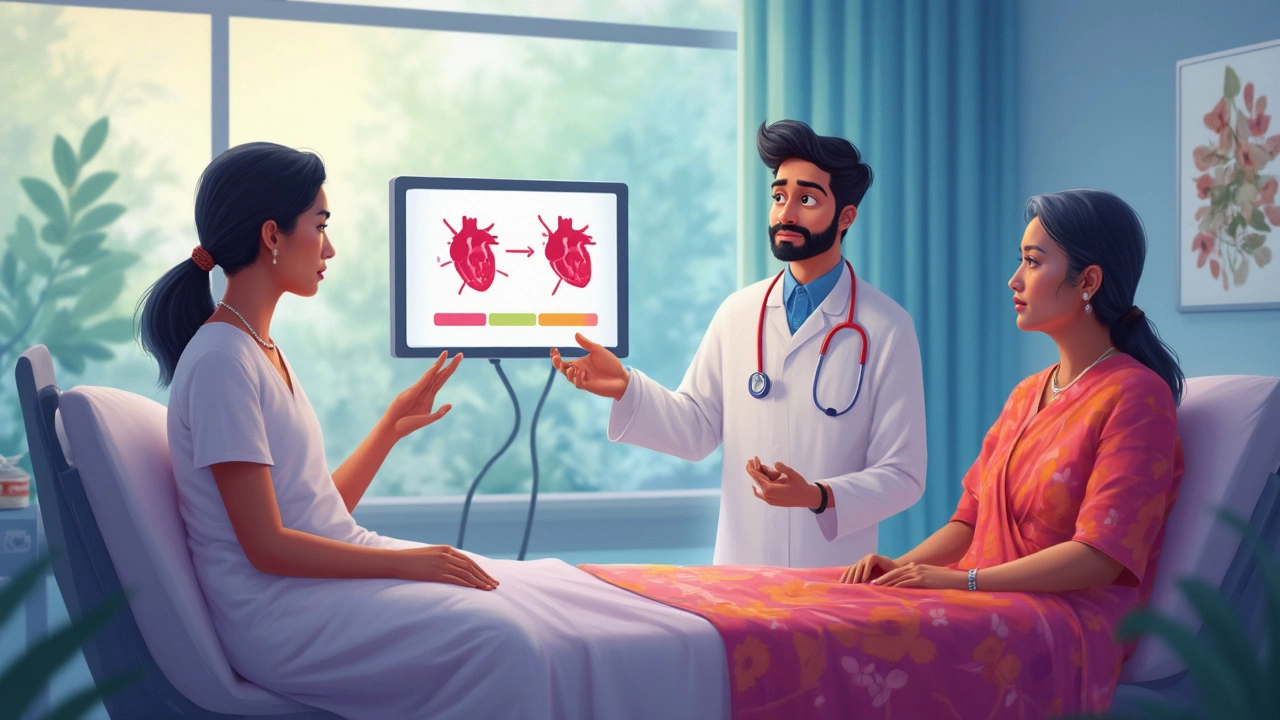Diving into life after heart surgery can be a maze of questions and concerns, especially when it comes to resuming normal activities. One common question that often doesn't get openly discussed is about resuming sexual activity, including oral sex. It's understandable; you're healing, and your heart needs time to adjust.
First things first, heart surgery recovery isn't just about physical healing. Your mental and emotional state comes into play too, which can make questions about intimacy feel awkward or even overwhelming. But, hey, it's a natural part of life.
So, how soon can you get back to it after surgery? Generally, doctors suggest waiting at least six weeks before resuming any sexual activity. This doesn't mean you can't do anything at all, but take it easy. Your surgeon or cardiologist should be your go-to for personalized advice.
- Understanding Heart Surgery Recovery
- Physical Activity and Heart Surgery
- Timing for Resuming Sexual Activity
- Safety Precautions to Consider
- Communication with Healthcare Professionals
Understanding Heart Surgery Recovery
Alright, so you've just had heart surgery, and you might be wondering what life looks like now. The key is understanding that recovery takes time and patience. It's not just about resting up; it's about gradually getting back on your feet in a way that doesn't overwork your heart.
After surgery, your body is in healing mode. This means you might feel tired, a bit sore around the incision, and emotions can be a rollercoaster. It’s all part of the process. Usually, you’re looking at about six to eight weeks before you start to feel more like yourself again, but everyone's different.
Physical Activity During Recovery
The big advice here is to start slowly. Doctors often recommend light activities such as walking short distances at first. This helps keep your blood flowing without putting too much strain on your heart. Think of it as a warm-up phase for your new heart health.
Emotional and Mental Recovery
Don't overlook what's going on inside your head and heart. Adjusting mentally to the changes after heart surgery can be tough. You might feel anxious or down, which is totally normal. Some people find that talking to a therapist or joining a support group helps.
Getting back into your usual routine can trigger mixed emotions, especially with activities you once took for granted. Understanding both your physical and emotional journey is crucial in making sure you’re getting the support you need.
Things to Keep in Mind
- Follow your doctor's advice to the T. If they say don't lift anything heavier than a milk jug, listen.
- Keep your wound clean and watch for any signs of infection.
- Know when to ask for help if you're feeling down or overwhelmed.
- Stay active but within the limits your doctor sets.
Remember, everyone’s recovery is different. If you’re unsure about any aspect of your recovery, don’t hesitate to ask your healthcare professional. Being proactive will help you bounce back stronger and move forward with confidence.
Physical Activity and Heart Surgery
Getting back on your feet after heart surgery takes a bit of patience, but understanding what you can and cannot do helps you heal better. Physical activity plays a crucial role, but it’s important to follow a doctor’s advice on how to approach it safely.
Why Physical Activity Matters
Regular movement can help prevent complications like pneumonia or blood clots, which are concerns post-surgery. However, the type and intensity of the activity need to match your recovery stage.
Light Activities to Start With
In the beginning, focus on light activities. We're talking about short walks around your house or gentle stretching exercises. These help get the blood flowing without placing stress on your healing heart.
- Take a 5-10 minute walk, two to three times daily.
- Include simple stretches, like neck rolls or ankle pumps.
- Ensure any activities don't leave you feeling dizzy or fatigued.
When to Increase Intensity
By about the six-week mark, most people can start to ease back into more regular activity levels. But again, keep it gradual. This is usually around the same time you might consider resuming certain personal activities, like resuming work or even some sexual activities.
Activities to Avoid
- Steer clear of heavy lifting or strenuous workouts initially.
- Sports that risk chest injury, like football or squash, should be avoided until you get a thumbs-up from your doctor.
Monitoring Your Recovery
As you ramp up the activity, closely monitor how you're feeling. Any chest pain or significant discomfort should be a red flag to pull back. Your heart will guide you, but when in doubt, your healthcare team is your best resource.
An easy way to remember key guidelines is the FITT principle: Frequency, Intensity, Time, and Type. This framework ensures you're not overdoing it while keeping track of your journey back to full health.

Timing for Resuming Sexual Activity
So, you're probably wondering, when's it safe to resume sexual activities, including oral, after you've had heart surgery? Well, here's the scoop: It's a lot like waiting to get back to exercising. Your heart needs time to heal and regain its strength after surgery.
Most doctors recommend holding off on any sexual activity for at least six weeks post-surgery. It might seem like a long time, but this period is essential for allowing your heart and body to recover properly. Just like how you'd be cautious with lifting heavy objects or engaging in strenuous activities, this caution applies here too.
Why Six Weeks?
The six-week mark isn't just pulled out of thin air. It aligns with the general recovery timeline for heart surgery. This timeframe helps ensure that your heart is stable enough to handle the increase in heart rate and blood pressure that comes with sexual activity. It's crucial to remember that everyone's body is different, so some might need a bit more time.
Checking In With Your Doctor
Before diving back into the world of intimacy, have a chat with your surgeon or cardiologist. They're your best resource for personalized advice. They'll look at your specific case and tell you if you're ready or if you need to ease back into it slowly. Don’t skip this step - their guidance is golden!
- Talk openly about your concerns and ask if any specific precautions are needed.
- Discuss any medications you're on that might affect your sexual function.
- Make sure you're clear on any symptoms that should make you hit the pause button.
Remember, prioritizing your health comes first. It's all about finding the right balance and pacing yourself as you get back to life's everyday pleasures, including intimacy after heart surgery.
Safety Precautions to Consider
When it comes to resuming activities after heart surgery, taking precautions is all about being smart and patient. Trust me, your heart will thank you. So, what should you keep in mind?
Listen to Your Body
Your body just went through a major procedure. It's like your heart's been on a wild adventure! If you're feeling tired or uncomfortable, even with small efforts, it's a sign you might need more rest. Don’t push it. A little caution now means you can get back to full speed sooner.
Communicate with Your Partner
Being open with your partner during this time is key. It's okay to set boundaries, and even more okay to ask for support. Emotional intimacy can sometimes be more satisfying than physical, especially when you’re focused on recovery.
Doctor Knows Best
Your healthcare professional is your best friend when it comes to tailoring advice specific to your situation. They're likely to give you guidelines regarding what kinds of activities are safe and when they can be resumed. Don't wait for the next appointment—reach out if you're unsure!
Meds and Mood
The medications you’re on can influence how you feel physically and emotionally, and certain meds affect sexual drive or response. It's worth discussing any changes or concerns with your doctor. They might adjust your meds to align with your lifestyle or needs.
Pacing is Everything
No need to plan for a marathon session right away! Consider starting slowly and gently. Let's walk before we run, so to speak. Your heart surgery recovery phase is a great time to rediscover patience.
| Activity | Recommended Wait Time |
|---|---|
| Walking | 3-4 days post-surgery |
| Light exercise | 4-6 weeks |
| Sexual activity | 6-8 weeks |
Keep these tips in mind, and you'll be on track to not just better recovery, but to a healthier relationship with your body and your partner.

Communication with Healthcare Professionals
Talking to your doctor about jumping back into intimacy after heart surgery can feel a bit awkward. But guess what? They're there to help you, and they’ve heard it all before. So, don’t shy away from bringing up anything that’s on your mind. Your health and well-being come first.
Why It's Important
Your healthcare provider knows your recovery after surgery better than anyone. They've tracked your progress and are the best person to tell you when you're ready for more physical activity, including sexual activity. This is not something any friend with Google can answer for you.Questions You Might Want to Ask
Here are some talking points you might want to cover during your next appointment:- What signs should I look for to know I'm ready to resume intimate activities?
- Are there specific positions that could be safer until I'm fully healed?
- Is there any medication I'm taking that might interfere with my sex life, including oral health?
Making the Most of Your Appointments
When you come armed with questions, your consultations become a lot more helpful. Make a list before you go and be honest about any concerns you have. This open line of communication can also help identify any potential issues early on, like discomfort or irregular heartbeats during simple activities.Follow-Up Appointments
Sometimes, it's not just a one-and-done conversation. Keep your healthcare professional in the loop as you start engaging in more physical activities. Follow their advice closely; they might suggest regular check-ups to monitor your heart's response to increased activity levels.So next time you're zoning out in the waiting room, don't let those questions float away. Your doctor’s there to guide you through your healing process. After all, living life fully again is the ultimate goal, right?
